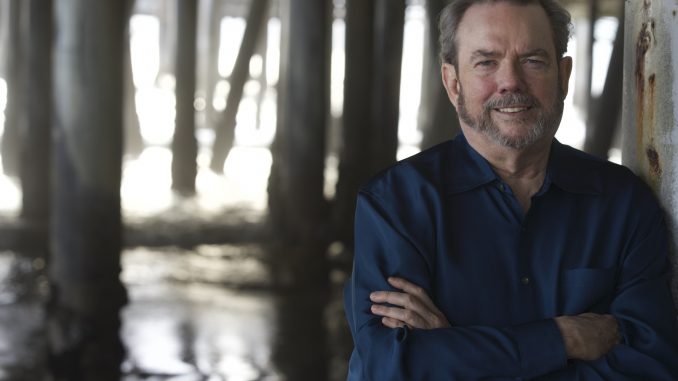
How could we have a series about songwriters and not include the outstanding Jimmy Webb! Of course, Webb’s songwriting isn’t focused on Americana, per se. He has written for a host of artists that have nothing to do with Americana – Richard Harris, The Supremes, 5th Dimension, and Thelma Houston, to name just a few – but if his only contribution to Americana music had been his collaboration with Glen Campbell it would still mark him as a major contributor to the genre, and his input goes way beyond that.
A phenomenal songwriter, Jimmy Webb remains the only artist ever to have received Grammy Awards for music, lyrics, and orchestration. That, in itself, is no mean feat. When you ally that to the roster of songs he has written you can clearly see why he is one of the outstanding Americana songwriters of the 60s, 70s, and 80s.
Born Jimmy Layne Webb in Elk City, Oklahoma in 1946, he grew up in a family that was both religious and conservative. His father, Robert Lee Webb, was a Baptist minister and an ex-Marine, who would only allow the family to listen to country and white gospel music on their radio. The young Jimmy Webb was raised around the church choir and was playing accompaniment to them on piano and organ by the time he was twelve. He started writing songs of his own, initially religious songs, but like most American teenagers was quickly influenced by the music coming from Elvis Presley and his contemporaries. Tellingly, the first record he bought was Glenn Campbell’s ‘Turn Around, Look at Me’, fascinated by the Texan’s voice.
I first became aware of Jimmy Webb, like most Brits at the time, when Richard Harris’ rendition of ‘MacArthur Park’ became a Top 10 hit in the UK. There was this sprawling, weird piece of melodrama, part sung, part spoken, that wasn’t quite like anything around at the time. Even then, at a relatively tender age, I realised that this was something distinct from the songs we were used to hearing in the charts. Of course, Webb’s star had started to rise long before Harris made him a recognisable name in the UK.
Following his studies in music at San Bernadino Valley College, in Southern California, Webb decided to pursue songwriting full time and started out transcribing other people’s music for a small, Hollywood based music publisher. Motown Records signed him to their publishing division, Jobete Music, and his first commercial recording, ‘My Christmas Tree’ was for The Supremes’ 1965 “Merry Christmas” album. Probably Webb’s most famous song, ‘By The Time I Get to Phoenix’, was first recorded by the singer Johnny Rivers, who featured it, along with another six Webb compositions on his 1967 album “Rewind”. Rivers, a producer as well as a performer, was working with a new band called 5th Dimension and commissioned Webb to write a number of songs for their debut album. They included ‘Up, Up and Away’, giving the band, and Webb, a first Top 10 single and Grammy Awards for Record of the Year and Song of the Year for 1967. Webb’s career as a songwriter was about to take off in a big way. Glen Campbell released his version of ‘By The Time I Get to Phoenix’ the same year and started the relationship between singer and songwriter that would define Webb’s contribution to Americana. Working together, they produced four outstanding singles that, in addition to ‘Phoenix’, included ‘Wichita Lineman’, ‘Galveston’, and ‘Where’s The Playground, Susie’. The two were always an unlikely combination. Campbell was ten years older than Webb and from another generation. Webb was a long-haired, near hippy and the rising wunderkind of American songwriting. Campbell was a no-nonsense conservative with traditional values. Apparently, the first words he ever said to Webb, at their first meeting, were “When are you going to get a haircut”! Webb, at the time, was developing a reputation as a hell-raiser and the two were an unlikely recording partnership but there is something quite special in the combination and Webb is on record as having said, “I still think that his voice and my songs had a special affinity for each other”. It was an affinity that gave rise to a lifelong friendship and Campbell would continue to record Webb songs right up to his final recording, ‘Adios’, the title track of Glen Campbell’s final album.

After that first flurry of outstandingly successful songs, Webb decided he no longer wanted to be a writer focused on producing songs solely for others to sing and turned his attention to becoming a singer/songwriter in his own right. This career change wasn’t helped by his first solo recording being an album of old demos, cleaned up and released by Epic in 1968 to capitalise on his songwriting success. “Jimmy Webb Sings Jimmy Webb” did him no great favours but, when his official debut album, “Words and Music” was released in 1970, it was to critical acclaim, with music critic, and future Springsteen manager Jon Landau, describing the track ‘P.F. Sloan’ as a “masterpiece that could not be improved upon”. In fact, all his early solo albums were well received critically but, while his identity as a songwriter has always been strong, Webb struggled to forge an identity as a performer. Perhaps, because of the lyrics of those Glen Campbell songs or, perhaps, because of the style of his big hit, ‘Up, Up and Away’, Webb struggled to lose the perception of him as a writer of songs aimed at what the industry thought of as the “Housewife market” at the time. He was considered middle of the road and a little safe, at a time when people wanted more edginess to their music. It’s a misdirected criticism because Webb’s songs are a long way from this perception. They often have a darkness rippling just below the surface and, if the melodies have a certain easiness when you really listen to the lyrics there is often a sting in the tale. This is from ‘P.F. Sloan’ –
“Old friend Trigger up and died
Now, they’ve got him stuffed and dried
You know, they’ve tanned his hide and crucified
Now, he’s staring glassy-eyed out through the parlor door”
In 1977 he released what is probably his best album under his own name, “El Mirage”, produced by George Martin, and containing many of his production hallmarks. It includes what, for me, is one of Webb’s best songs, ‘The Highwayman’. Adopted by the country music supergroup of Johnny Cash, Willie Nelson, Waylon Jennings, and Kris Kristofferson, it became their band name and their signature song, and their classic recording of the song earned yet another Grammy award for Webb. More recently, he was approached by The Highwomen, the group formed by Amanda Shires, Brandi Carlile, Maren Morris, and Natalie Hemby, and asked if he would re-write his lyrics to give the song a female perspective. Rather than do this, Webb told the band to re-write the lyrics themselves and give their own imaginations the chance to craft the song they wanted. Webb is a writer who always serves the song and he knew that The Highwomen would do a more personal job of creating their own version of the song than he could. For me, that shows a writer confident enough in the identity of his work to give someone else free rein in adapting it. Webb’s songs have been covered extensively, both by the greats and the barely known, and that’s something that’s still going on. Webb himself continues to tour and perform and he continues to write new songs, because writing songs is what he does.
Webb was inducted into the Songwriters Hall of Fame in 1986 and the Nashville Songwriters Hall of Fame in 1990. He received the National Academy of Songwriters Lifetime Achievement Award in 1993, the Songwriters Hall of Fame Johnny Mercer Award in 2003, the ASCAP “Voice of Music” Award in 2006, and the Ivor Novello Special International Award in 2012. His song ‘By the Time I Get to Phoenix’ has been identified as the third most performed song in the fifty years between 1940 and 1990. No mean feat for the boy from Oklahoma.



Great article Rick. I first encountered Jimmy Webb thanks to his amazing book Tunesmith. He taught me great things. Interesting to hear of his background, clearly he was/is a bit of a rebel, as well as a master songwriter.
Glad you enjoyed it Ryan. ‘Tunesmith’ is an excellent book and there’s really not much that Jimmy Webb doesn’t know about writing good songs.